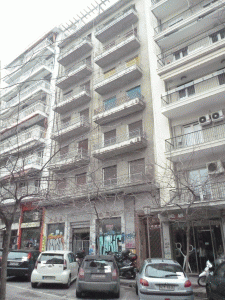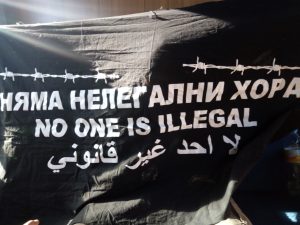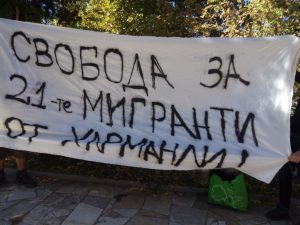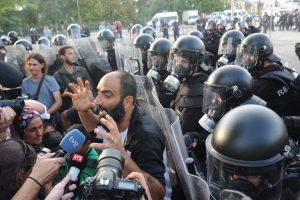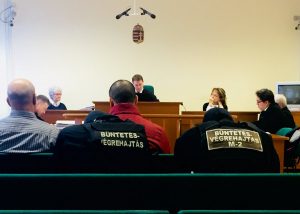Report on Bosnia // Oct 13th 2018
The situation in Bosnia is very different from the one in Serbia. Many local people are really nice and supportive, several different organisations – NGOs, but also officials (UNHCR, IOM, …) – are working on the field. MSF are active, too, and are (as always) great with supporting volunteer groups. There are also several active volunteer groups, not many which are explicitly political and some who are cooperating with IOM (and therefore depending on them).
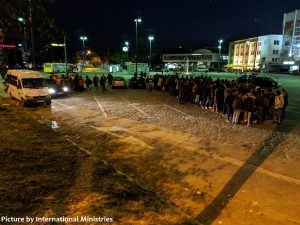
Train station in Sarajevo, photo credits to BASIS Sarajevo
Up until now, police has been quite friendly: they’re not beating up people and people crossing into Bosnia from Serbia are being warned of landmines instead of being pushed back. However, with the rising number of people entering the country the police is getting more and more overwhelmed, conflicts are getting worse, the first stabbing took place in Sarajevo last week. Also there are rumours about a migrant who died in Sarajevo recently, which probably was an accident, but nobody knows about it. We are trying to find out about that. Still, police violence is increasing and there are videos published of random slappings of migrants/refugees, videos of policemen insulting migrants/refugees, and reports of volunteers standing up for a humane treatment of refugees who are being pushed around by police. There is one testimony of Bosnian police violence, but also several reports of robbing by Bosnian police in Republika Srpska, where police made refugees/migrants pay for being able to continue their way, while half an hour later a police car was waiting for them to push them back. There are reports of Croatian police pushing people back into landmine areas after they had been robbed and beaten. Also, there are reports about Bosnian policemen from Republika Srpska making people strip to their underwear, handcuffing them, beating them up and leaving them in an abandoned house where they were found by locals who gave them clothes and put them on a bus to Sarajevo. Further it is being reported that several people drowned in rivers and also unconfirmed reports people crossing mountain regions being hit by falling rocks.
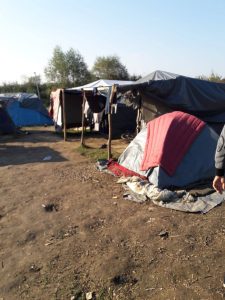
wild camp at Velika Kladusa, photo credits to NoNameKitchen
Then there is Velika Kladusa, a smaller town in the border area, which is having a sort of official wild camp with No Name Kitchen working there, food distribution taking place and some showers being provided. There are other organisations coming, and while things are still quite chaotic, the police is coming over, too (not causing trouble but rather doing crowd management for distribution in a quite humane way). Volunteers there are mostly long-term, seem overworked and not so easy to work with. What is distinct about V. Kladusa is the fact that if you managed to cross into Croatia, the Slovenian border is only 70-80 km further. However, it is heavily monitored (something like an audio radar, drones, infrared cameras, as far as we know), and there are also push-backs taking place from Slovenia to Bosnia (crossing 2 borders). There are reports about heavy violence during push-backs especially by Croatian police (beatings, robbing of clothes, phones, shoes, also women and children are affected). No Name Kitchen is also publishing reports on police violence.
Next spot is Bihac (haven’t been there), most refugees/migrants are staying there. It is soon to be an official camp (for around 1,000 people), but at the moment, it is merely an empty unfinished building called Borici Camp, which used to be a students’ dormitory but was abandoned. The building is so run-down it now has holes in the floor where people are falling through and stairs without handrails. It is now run by the Bosnian Red Cross and also open for families who are being sent there from Sarajevo. People also try the game there, crossing from the western border into Croatia. At first sight, this doesn’t seem to make much sense since the way through hostile Croatia is much longer, but since V. Kladusa is heavily monitored people have to try the game elsewhere.
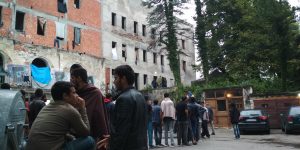
Bihac, photo credits: Balkan Insight
There are reports about a huge fight between different ethnicities a couple of days ago, after which police sent people away from Bihac to Velika Kladusa. Those reports came from Velika Kladusa where some people were sent to, but most people directly returned to Bihac. Conditions at the official camp in Bihac are better for families, since there supposedly is some medical support taking place and people do not have to camp in summer tents in muddy fields.
Another city where things are happening is Mostar more in the southwest of Bosnia. There is a so-called reception centre named Salakovac with an official camp. People also try crossing from there and there are many children there because the facility is meant for families.
The camp Delijas for single men is called an open reception center – also for resting and medical healthcare. As long as Delijas is not full, IOM, UNHCR and Bosnian authorities can say that there is still space in the camps. It is 3 hours to the next bus stop and 1 hour to get to the next mini store. One has to keep in mind that there is no phone signal at all, so communication with family and getting further information is not possible.
There are also plans for setting up a bigger camp (capacity up to 1,300 ppl) in Hadzici, which should be amazing. Pomozi, a local charity organization for people in need (elderly, poor, Roma people, children lacking school equipment, doing food distribution) is participating in setting it up and it is supposed to be similar to a hotel where the inhabitants can get keys and leave them when they go out. Pictures of facilities which have been published promise a life in dignity, with containers suitable for winter weather, but they will probably accept mostly families, too. Additionally, their capacities will probably only be suitable for 1,300 people when winter is there. At the moment, they are at a max. of 400 people.
In general it seems like it’s mostly families that are taken care of, single men are mostly left to the streets because there are not enough capacities. They either sleep in the streets or squat empty buildings, or – if they can afford that- sleep in some of the hostels. For Sarajevo (which is actually not that big – around 230,000 inhabitants) – there are also a lot of people sleeping in the streets, in empty houses and so on. There is food distribution (2 times a day) and non-food items distribution (once a day after dinner) taking place, and showers provided in the stadium 3 times a week. Volunteer groups in Sarajevo are splitting up more and more. There is competition rising and some becoming power hungry. Generally one can say that the situation for NGOs and volunteer support has more difficult since the EU has started providing money for it, which doesn’t make services any easier.
At SFA (Service for Foreigners’ Affairs) people have to express their intention to apply for asylum in order to get a pre-paper that is valid for 14 days. Until then, they have to get a white card (therefore it is necessary to have a confirmation by a hostel or people have to stay in a camp for around a month or two), which has to last for about a month until they can receive a yellow card, which allows them to work after 9 months and provides access to broader health care. The Service for Foreigners’ Affairs is registering people when they come there, taking names, fingerprints and pictures. Family members are being listed with the father of the family. There doesn’t seem to be a big repression issue about that (at the moment). In general it seems like many people are spending several months in Bosnia, trying to cross. Most of the people were in Sid, Serbia, before.
Another local group is Vasaprava, which is also funded by UNHCR, providing legal help somehow. They are in an office in Sarajevo and other places throughout Bosnia but are also supposed to come to lunch distribution at the train station. The House of All is hosting mostly families and has capacities for up to 100 people. They have a kitchen that also used to give out food for people in the streets in the beginning. Aid Brigade and Collective Aid are cooking for the streets now. Another special place is Pomozi – it is a local charity organisation with a warehouse where donations for refugees can be stored and sorted. Furthermore, there is the Bosnian women’s initiative which provides psychological and psychiatric help. They are providing a lot of medication but no continuous treatment since they are not used to working with people in the streets.
I also heard about some mental institutions, where people possibly “disappear” into. There is a psychiatry, which is also used as a closed camp called Doboj, where authorities are basically dumping people: human trafficking victims, addicts, and people with mental problems. The situation of the patients/inhabitants is described as totally isolated: their phones are taken away so they won’t be able to communicate. But at least there are good facilities, as people who have been there told us about. One good thing is that so far, Bosnian prisons are only for Bosnians.
credits for translation and correcting: J. Schley, Berlin




